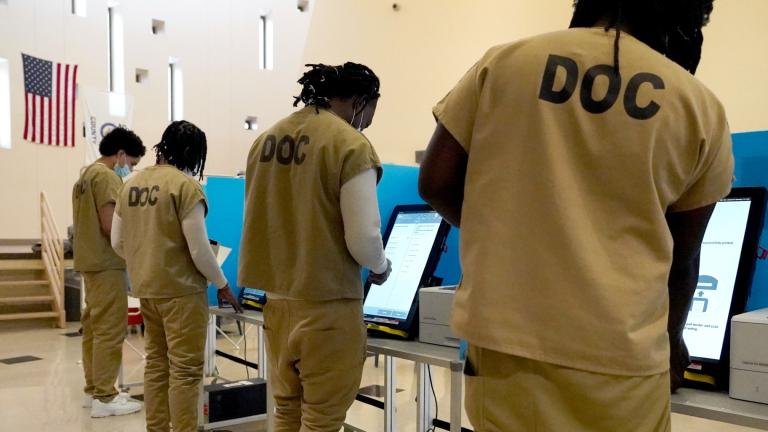On her way to class, Mindy Kalchman, a DePaul University professor who teaches math to detainees at Cook County Jail through a national program called Inside-Out, spontaneously thinks of a reading her students might enjoy.
However, her unconventional classroom setting presents a challenge: she can’t bring in last-minute paper reading materials.
So, she’s forced to get creative.
“I’ve been writing things on my arm. … If I want to remember who the groups are, I put them on my arm. Or if there’s something I’m thinking about on my way to the jail that I want to bring up … I write it on my arm,” Kalchman said.
Before her lecture, Kalchman undergoes a series of security checks: her ID is thoroughly verified, she passes through metal detectors and security personnel conduct a pat-down search. Before entering the jail, all her materials, including paper, must be screened days in advance.
The paper inspections are part of a facility-wide restriction to limit external paper.
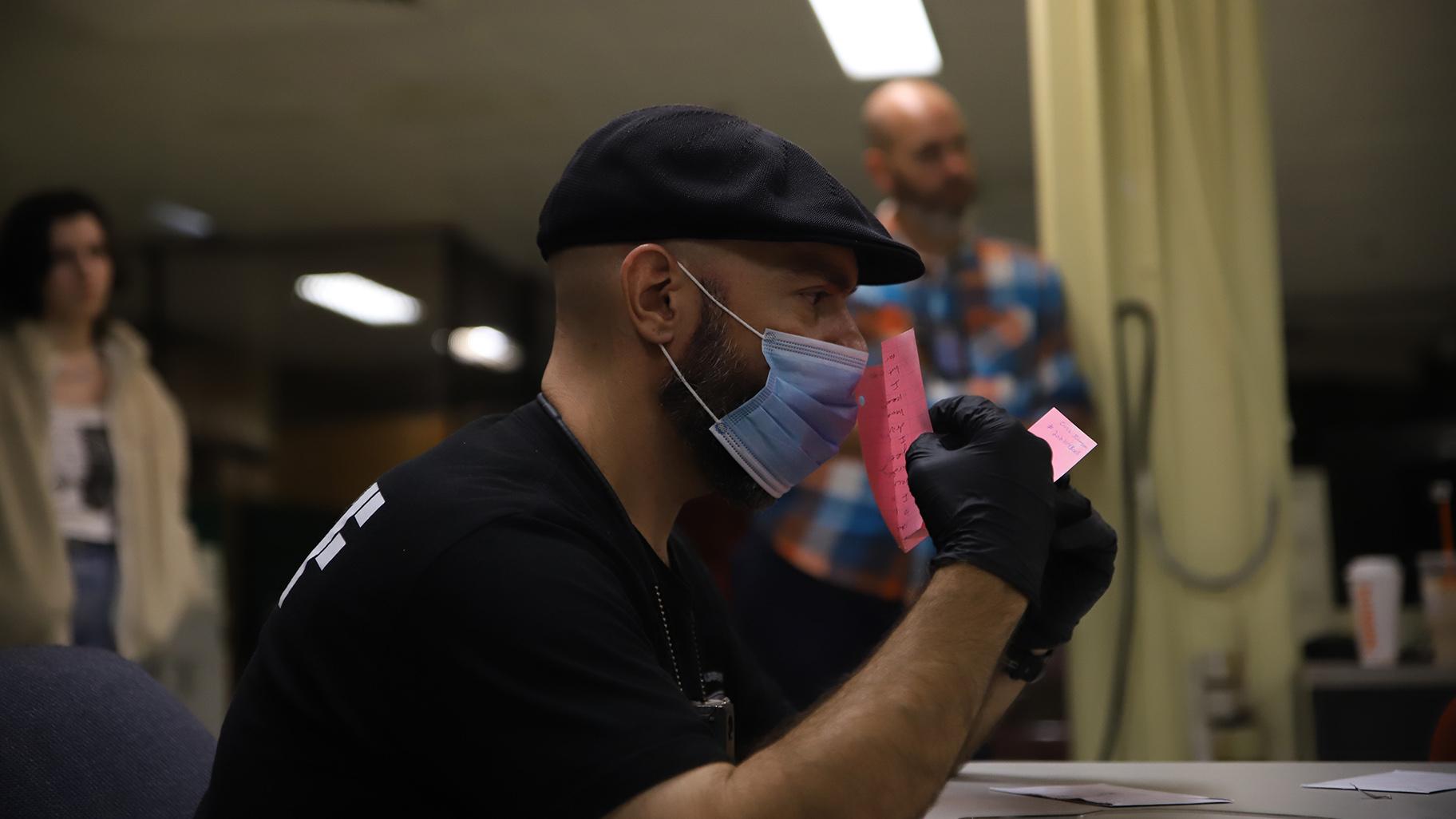 Jail personnel go through stacks of letters and books in the mail room at Cook County Jail on Oct. 12. All mail coming into the jail has faced greater screening methods since the paper restriction began in April. (Cary Robbins / DePaul)
Jail personnel go through stacks of letters and books in the mail room at Cook County Jail on Oct. 12. All mail coming into the jail has faced greater screening methods since the paper restriction began in April. (Cary Robbins / DePaul)
Since the beginning of 2023, Cook County Jail administration has reported 16 deaths in custody, with five attributed to overdoses, three of which involved synthetic cannabinoids, according to Cook County Medical Examiner records.
This hidden substance is frequently concealed, jail officials say, in paper-like items including photographs, books and letters mailed to detainees. Synthetic cannabinoids, a lethal substance, becomes even deadlier when mixed with additives like fentanyl and rat poison, meant to enhance the user’s experience when smoked.
To address the uptick in overdose deaths, jail leadership took unprecedented measures, including what some called a facility-wide paper ban in April of this year following detainee fatalities related to synthetic cannabinoids soaked into paper.
Paper Screening
Cook County Jail, one of the largest detention facilities in the United States that houses nearly 5,000 detainees awaiting trial, is grappling with an increase in drug overdoses linked to synthetic cannabinoids, a psychoactive substance commonly recognized as “K2” or “Spice,” which mimics the effects of cannabis.
The deaths this year stand in contrast to the past three years when there were no deaths among detainees from synthetic cannabinoids. So far this year, 17 detainees have been indicted for possession of drug-soaked paper, according to a sheriff’s official
 Bags of evidence lay on a table at Cook County Jail on Oct. 12. Books like "On Writing" by Stephen King were found as evidence having drug soaked paper inside. (Cary Robbins / DePaul)
Bags of evidence lay on a table at Cook County Jail on Oct. 12. Books like "On Writing" by Stephen King were found as evidence having drug soaked paper inside. (Cary Robbins / DePaul)
In a room inside the jail, spread across a conference table, officials showcased various confiscated papers. Among the seized items were postcards, books like “On Writing” by Stephen King and braided pieces of toilet paper used as wicks.
“I cannot stress how serious this is,” said Dr. Priscilla Ware, who oversees Cook County Correctional Health and is medical director of Cermak Health Services. “People are dying from this product every single day when they use it.”
 Dr. Priscilla Ware, who oversees Cook County Correctional Health and is medical director of Cermak Health Services talks about the health conditions of those who have died due to smoked paper soaked in drugs on Oct. 12. Ware explained how quickly people can die from smoking the papers. (Cary Robbins / DePaul)
Dr. Priscilla Ware, who oversees Cook County Correctional Health and is medical director of Cermak Health Services talks about the health conditions of those who have died due to smoked paper soaked in drugs on Oct. 12. Ware explained how quickly people can die from smoking the papers. (Cary Robbins / DePaul)
Autopsy reports indicate that two detainees were found unresponsive, with drug paraphernalia nearby, including partially burnt paper laced with synthetic cannabinoids, shortly before their deaths. A third detainee died from synthetic cannabinoids in the past year; however, the autopsy report does not indicate whether drug paraphernalia was at the scene.
“This type of overdosing, though, is just it’s never been seen here or throughout the country,” said Jane Gubser, Executive Director of Cook County Jail.
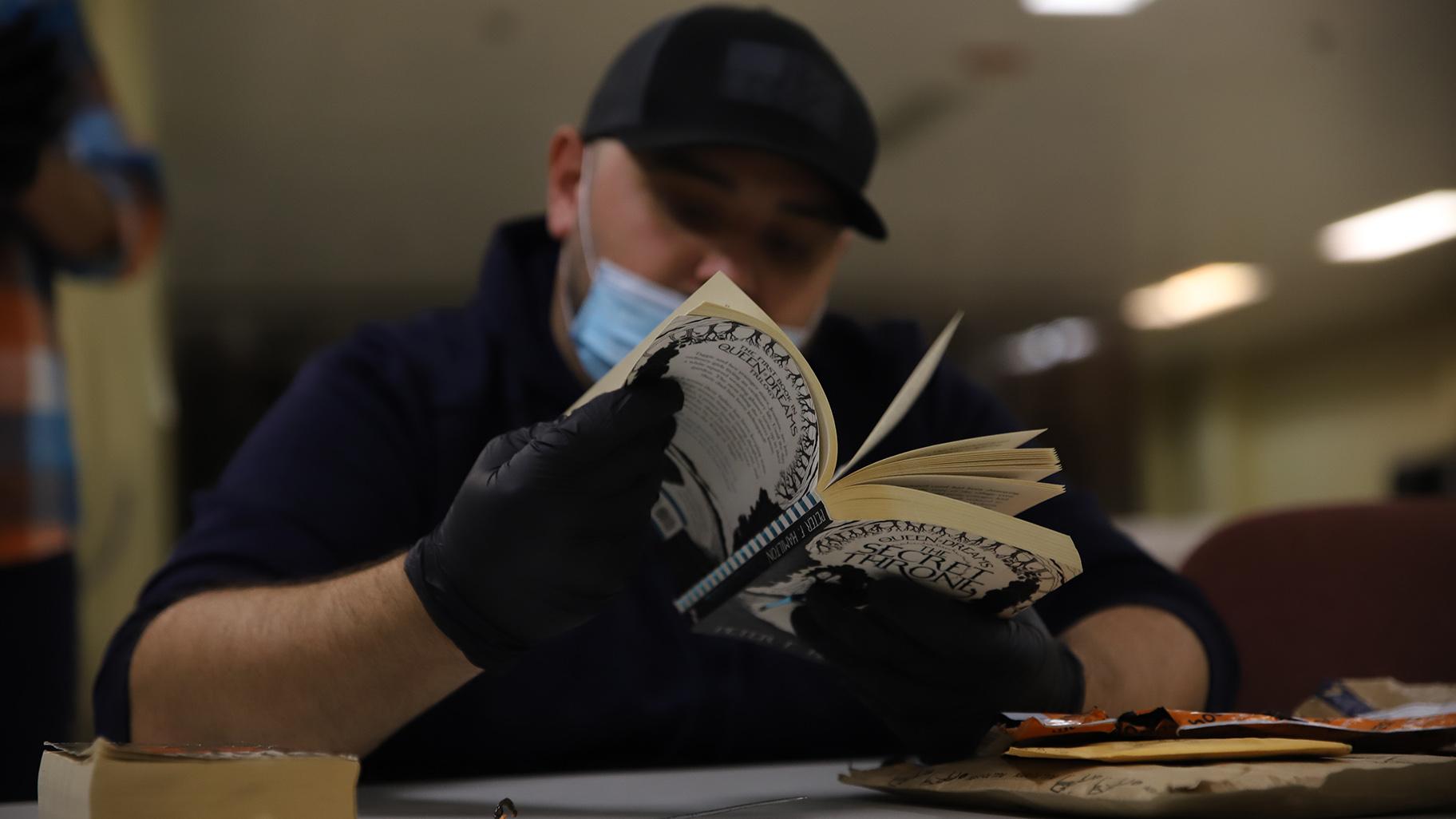 Jail personnel go through stacks of letters and books in the mail room at Cook County Jail on Oct. 12, 2023. All mail coming into the jail has faced greater screening methods since the paper restriction began in April. (Cary Robbins / DePaul)
Jail personnel go through stacks of letters and books in the mail room at Cook County Jail on Oct. 12, 2023. All mail coming into the jail has faced greater screening methods since the paper restriction began in April. (Cary Robbins / DePaul)
In a fluorescent-lit mail room at a single table, four masked and gloved Cook County officers sift through a range of postcards, photographs, handwritten letters, books and magazines to determine whether they believe the material is soaked in drugs. On top of page-flipping and spine examination, officers also use touch and smell to inspect paper materials, setting aside those suspected of tampering.
While the routine inspection of incoming mail for contraband, including substances like marijuana and cocaine, along with other prohibited items, is a well-established practice, the emergence of synthetic cannabinoids has prompted jail officers to inspect detainees’ mail more closely.
“We started talking about paper over the past two years…and it’s new, we’re all still learning about it,” Gubser said. “We don’t necessarily fully understand it, and I don’t think that the people who are using it are fully aware of it. And it has lethal consequences.”
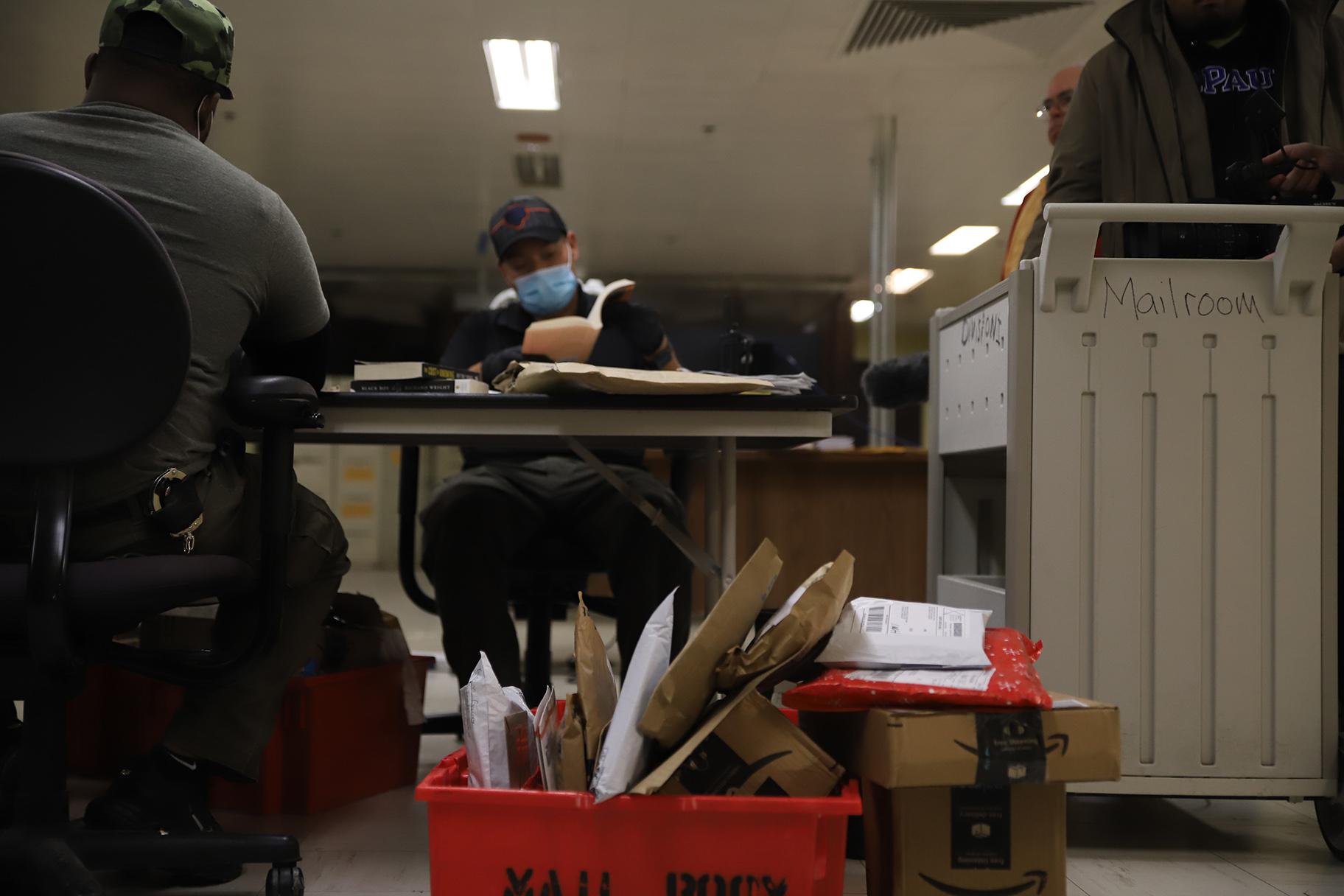 A group of jail personnel sniff, touch and pass around stacks of letters and books in the mail room at Cook County Jail to check for paper soaked in drugs on Oct. 12. All mail coming into the jail has faced greater screening methods since the paper restriction began in April. (Cary Robbins / DePaul)
A group of jail personnel sniff, touch and pass around stacks of letters and books in the mail room at Cook County Jail to check for paper soaked in drugs on Oct. 12. All mail coming into the jail has faced greater screening methods since the paper restriction began in April. (Cary Robbins / DePaul)
Synthetic Cannabinoids
While cannabinoids have a similar appearance to marijuana, the compound is more addictive and can yield graver side effects when smoked, according to those who have studied the drug.
Cannabinoids are a combination of various man-made chemicals commonly used as an alternative to marijuana, according to the Centers for Disease Control and Prevention (CDC). The CDC claims those who smoke synthetic cannabinoids can face a range of side effects like rapid heart rate, vomiting, agitation, confusion, hallucinations and even death.
The National Institute on Drug Abuse (NIDA) states illicitly manufactured synthetic cannabinoids are commonly added to liquid cartridges in vaping devices or shredded plant material to be smoked.
For Justin Wilks, executive director of the Department of Investigations with the Cook County Sheriff’s Office, combating the rise in drug-soaked paper laced with synthetic cannabinoids is a top priority.
“It is because we have a duty to protect, so we have to sometimes protect them from themselves,” Wilks said.
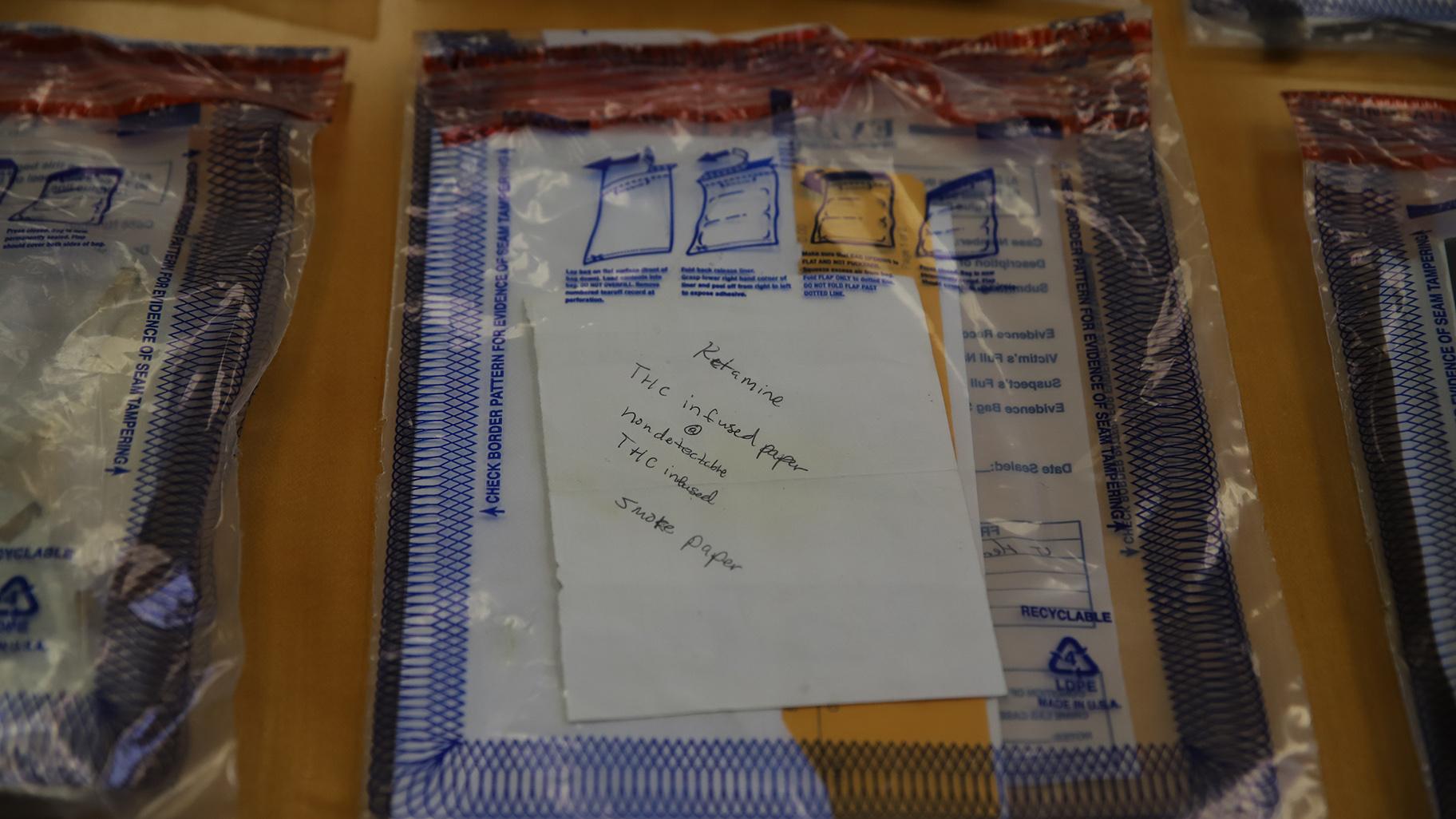 Bags of evidence lay on a table at Cook County Jail on Oct. 12, 2023. One bag showed a piece of paper with instructions on how to smoke the drug soaked paper was found at one scene. (Cary Robbins / DePaul)
Bags of evidence lay on a table at Cook County Jail on Oct. 12, 2023. One bag showed a piece of paper with instructions on how to smoke the drug soaked paper was found at one scene. (Cary Robbins / DePaul)
Mental Health and Substance Abuse
Gubser, the Jail’s executive director, said about 60% of detainees have substance use problems.
“A lot of people in jail are not necessarily using drugs because they’re addicted to drugs,” Gubser said. “They’re using drugs because they’re in a terrible situation and they want to not think about what’s going on or get a little bit of relief.”
Research by the Vera Institute, an organization that looks for ways to end mass incarceration and restore communities, found overdosing “is the leading cause of death among people recently released from prisons and the third leading cause of death in U.S. jails while in custody.”
In addition to substance abuse, many detainees also face mental health issues. According to the Cook County Sheriff’s office, nearly half the detainees at the jail experience some form of mental illness.
This is representative of many jails across the country. The Treatment Advocacy Center found in 44 states, a jail or prison holds more people with mental health issues than the largest state psychiatric facilities that remain.
Of Cook County Jail’s $378 million operating budget, about $3 million is spent on Behavioral and Mental Health services, according to public records. The money, according to a Sheriff’s Department spokesman, is used to staff treatment programs.
Gubser said the jail hired a recovery support specialist to assist detainees with mental health needs.
“I’d say about 50% of people she (recovery support specialist) talks to say, Yeah, I think I actually need to talk to someone,” Gubser said.
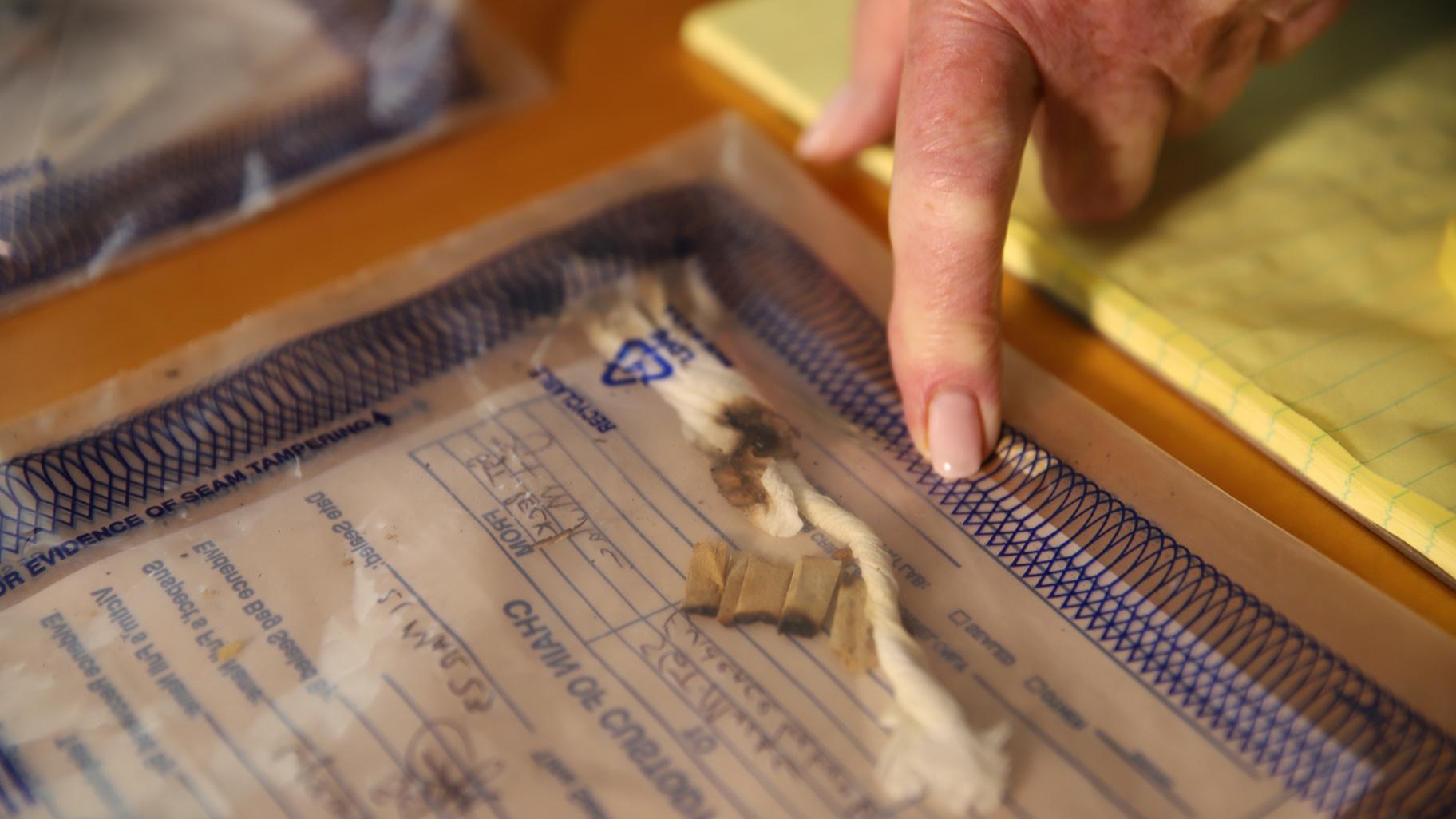 Evidence of drug-soaked paper rolled up was found at the scene where people died due to overdosing on drugs. (Cary Robbins / DePaul)
Evidence of drug-soaked paper rolled up was found at the scene where people died due to overdosing on drugs. (Cary Robbins / DePaul)
Looking Ahead
While the jail eased paper restrictions for attorneys Sept. 21, as of October, the guidelines for those seeking to send mail to loved ones inside remains unchanged.
“Anytime you create change in a system this large, I think there’s hesitation and frustration and questions and confusion,” Gubser said.
For Mindy Kalchman, the DePaul professor, the confusion is real. She said the paper restrictions have significantly hindered her teaching ability.
The Prison Policy Institute, an advocacy group focused on highlighting the harm of mass criminalization, says that education is one of the most important factors contributing to reentry success once released, especially if the individual is seeking employment.
Despite the restrictions, Kalchman remains resilient.
“I would not do anything else. This is the next phase of my career. I mean, I can only hope that if this goes away, it’ll be easier,” Kalchman said.






